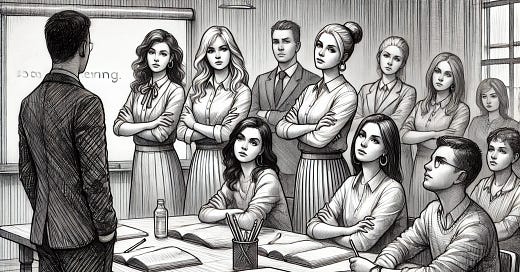S1. C13. A Lesson in Resistance: Why the Global Citizen Program never took off?
This social experiment at Fundamental Decisions was a stroke of serendipity, revealing deep-seated resistance to the very issues that shape mindset evolution—even among educators.
A Warm Welcome Turns Cold
Two weeks ago, I walked through the school gates, the afternoon heat settling on my shoulders. The air felt light, charged with the promise of something new. My mind buzzed with anticipation—this was the second day, and the first meeting had been nothing short of a success.
I replayed yesterday’s conversation in my head. The director had listened intently, her eyes lighting up as I outlined the mindset-first approach to learning. She had nodded, engaged, and even suggested bringing a couple of teachers on board. It felt like the right start.
Today, I stepped into the meeting room, expecting a small group. Instead, I faced a room full of teachers—far more than planned.
I straightened my posture. Alright, let’s deal with it.
The Unexpected Shift
I took a deep breath, steadied my voice, and greeted the room.
"Good evening, everybody."
No unnecessary fluff. I moved with precision, introducing the program’s purpose, its impact worldwide, and the vision for this particular pilot. This was more than an introduction—it was the foundation of something meaningful.
Silence.
I scanned the room. No follow-up questions. No engagement.
Skepticism? A lack of trust? Maybe they didn’t feel the director should be making this decision for them?
The warmth I had felt yesterday was gone, replaced with a quiet, reserved resistance. Still, I pressed forward, explaining the curriculum, its principles, and its real impact on students.
Then—another obstacle.
The school’s network failed.
The videos, the visuals, the supporting evidence that was meant to bring the program to life—gone. The session limped to an end, with a few obligatory questions but no real discussion. No momentum.
I walked out of that room still hopeful.
That hope didn’t last long.
The Backlash
The next morning, a message from the director arrived.
The program was canceled.
A quiet uprising had taken place overnight. Not just a few skeptical voices—every teacher had rejected it.
I read the words again.
"They don’t know who you are."
When I called the director, her voice was measured but tinged with disappointment.
"They don’t know what this is about."
I leaned back in my chair, my mind racing. Had my delivery lacked inspiration? Had the technical issues hurt credibility? Was it just the fear of extra work?
Maybe. But something deeper was at play.
The Root of Resistance
This wasn’t just hesitation—it was doubt.
Not doubt about the methodology, but about the intention behind it.
Who are these outsiders offering free training?
What’s the catch?
Why would an international group care about this school?
And then, another realization: insecurity.
If the program succeeded, it would highlight weaknesses in traditional teaching methods. If students showed rapid improvement, teachers might feel their authority was being challenged. And what if parents started questioning why their children were learning more effectively outside the school system than within it?
This wasn’t simple skepticism—it was self-preservation.
Strategic Missteps
I saw the cracks.
Too many people, too soon. The director had involved a large group of teachers before we had established trust. The outsider effect had kicked in—an unfamiliar entity entering an established system, uninvited by those who would be most affected by it.
Unclear value for teachers. What was in it for them? More work? More scrutiny? Without a clear incentive, resistance was inevitable.
The Next Move
That night, I sat at my desk, weighing the options.
Push forward? Try to salvage this school?
Pivot? Engage parents or community members instead?
Step away? Learn the lesson and move on?
One thing was clear—the strategy needed to change.
We needed a stronger decision-maker, someone who could hold the vision even when resistance surfaced. The narrative had to shift—this wasn’t about replacing teachers, but empowering them. And most importantly, we had to control the environment where the program was introduced.
This school had shut its doors. But the journey wasn’t over.
I picked up my phone and called the director.
"Not to worry, Director," I said, keeping my voice calm.
"We face thousands of rejections before any possible agreement. Such is our journey. If they are not ready, then I have not inspired them enough, and for that, I am at fault too. We will keep the doors open. When they are ready, they will find us waiting."
I set the phone down, exhaling. The lesson was clear.
The Final Question
If educators, the very people meant to prepare the next generation for change, resist transformation themselves—
How do we create an environment where change isn’t just accepted, but embraced?
💬 What do you think? Have you ever faced resistance when introducing something new? How did you navigate it? Share your thoughts in the comments! 👇




Fearing more work and a threat to established ways, suspicious teachers rejected the Global Citizen program, causing unanticipated pushback to DAV79's promising effort. The initiative was abruptly cancelled due to the lack of a clear value proposition for instructors and early exposure to scrutiny. DAV79 decided to change the narrative and present the program as an empowering tool rather than a disruption after seeing the need for a more robust approach. Undaunted, he remained open to new prospects, realizing that true transformation requires time and the correct environment to thrive.